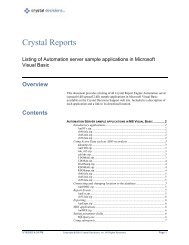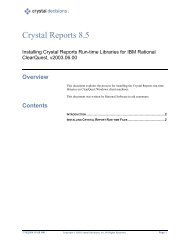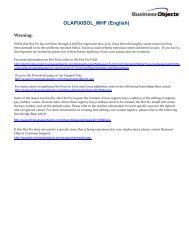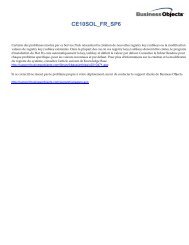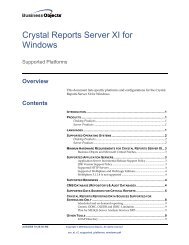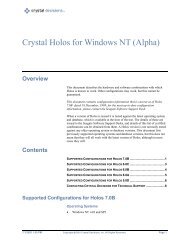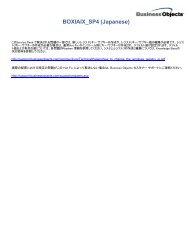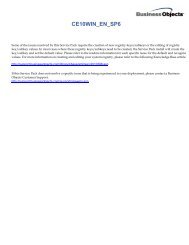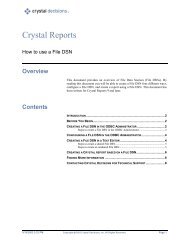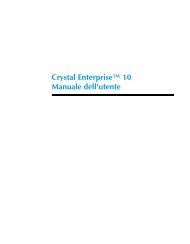Service Pack Readme (Adapt)
Service Pack Readme (Adapt)
Service Pack Readme (Adapt)
Create successful ePaper yourself
Turn your PDF publications into a flip-book with our unique Google optimized e-Paper software.
CE10WIN_EN_SP3<br />
Server functionality<br />
ADAPT00415049<br />
Description:<br />
Patch ID: 37256599<br />
The MaxNumOfRecords property in the Report Application Server SDK for Crystal Enterprise 10 fails to limit the number of records that are<br />
returned.<br />
The cause of the problem is a fault in logic in the ErrorOnMaxNumberOfRecords property.<br />
New Behavior:<br />
This problem is resolved.<br />
Known Limitations:<br />
A new property on the ReportOptions, called ErrorOnMaxNumberOfRecords, must be set to "False" to have the data truncated when the<br />
MaxNumOfRecords limit is reached.<br />
By default this property is set to "true" and if a report exceeds MaxNumberOfRecords, an error is displayed when users try to view a page or<br />
retrieve data.<br />
Users must clone the ReportOptions, change settings in the clone, and then assign it back to the client document.<br />
Server management<br />
ADAPT00323943<br />
Description:<br />
Patch ID: 36610954<br />
The PageServer misinterprets the properties option "Database Records to Read When Previewing or Refreshing a Report." Setting this option to<br />
a value greater than 65535 results in an incorrect number of records being read.<br />
The cause of the problem is that the PageServer reads the value as a 16-bit variable, rather than a 32-bit variable.<br />
New Behavior:<br />
The PageServer reads the value as a 32-bit variable, so that the PageSever can accept a limit of up to over a billion records. Numbers over a<br />
billion will change the option to "Unlimited records."<br />
ADAPT00346911<br />
Description:<br />
Patch ID: 37042716<br />
When a user schedules a report from e-Portfolio to run once a week on a particular week each month, a duplicate successful instance is created.<br />
This problem happens if the “Start Time” in the scheduling page is earlier than the schedule date. That start time will be chosen as the schedule<br />
time; therefore, when the actual scheduling time occurs, two successful instances are created.<br />
New Behavior:<br />
This problem is resolved.<br />
To fix this problem, the scheduling format for date and time named “first run time” is used.<br />
Set Location



